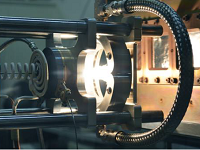Liquid Fuels and Electricity from Intermediate-Temperature Fuel Cells

Technology Description:
FuelCell Energy will develop an intermediate-temperature fuel cell that will directly convert methane to methanol and other liquid fuels using advanced metal catalysts. Existing fuel cell technologies typically convert chemical energy from hydrogen into electricity during a chemical reaction with oxygen or some other agent. FuelCell Energy’s cell would create liquid fuel from natural gas. Their advanced catalysts are optimized to improve the yield and selectivity of methane-to-methanol reactions; this efficiency provides the ability to run a fuel cell on methane instead of hydrogen. In addition, FuelCell Energy will utilize a new reactive spray deposition technique that can be employed to manufacture their fuel cell in a continuous process. The combination of these advanced catalysts and advanced manufacturing techniques will reduce overall system-level costs.
Potential Impact:
If successful, FuelCell Energy’s intermediate-temperature fuel cell will cost-effectively convert methane to methanol and other liquid fuels using a small, modular technology.
Security:
Enabling more efficient use of natural gas for power generation provides a reliable alternative to other fuel sources—a broader fuel portfolio means more energy security.
Environment:
Flaring and venting of natural gas results in significant greenhouse gas emissions. Converting stranded natural gas to a liquid fuel simultaneously reduces greenhouse gas emissions and produces valuable products.
Economy:
Distributed generation technologies would reduce costs associated with power losses compared to centralized power stations and provide lower operating costs due to peak shaving.
Contact
ARPA-E Program Director:
Dr. Grigorii Soloveichik
Project Contact:
Mr. Carl Willman
Press and General Inquiries Email:
ARPA-E-Comms@hq.doe.gov
Project Contact Email:
CWillman@fce.com
Partners
University of North Dakota Energy & Environmental Research Center
University of Connecticut
Pacific Northwest National Laboratory
Massachusetts Institute of Technology
Related Projects
Release Date:
11/25/2013
